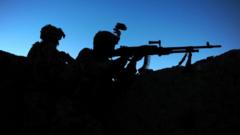The aftermath of the BBC Africa Eye investigation has ignited public demand for accountability within Kenya's security forces after the tragic deaths of protesters during demonstrations against a controversial finance bill.
Calls for Accountability Intensify After BBC Documentary Exposes Police Violence in Kenya

Calls for Accountability Intensify After BBC Documentary Exposes Police Violence in Kenya
Human rights organizations push for investigations into fatal police actions during anti-tax protests, following alarming revelations in a BBC documentary.
In a striking escalation of unrest, more than 100,000 Kenyans flooded the streets of Nairobi on June 25, 2024, protesting against a controversial finance bill related to tax increases. The uproar has prompted leading human rights organizations to demand investigations into the involvement of police and military personnel in the killings of three unarmed protesters, an issue that has thrust the government into the spotlight.
The concerns come in the wake of the BBC’s Africa Eye documentary, "Blood Parliament," which uncovered painfully detailed accounts of how security forces acted violently against demonstrators. Organizations including Amnesty International and the Kenya Human Rights Commission (KHRC) have insisted that implicated officers should be held accountable for their actions. The Kenyan government has made a statement through its spokesperson emphasizing the value of every life, describing the BBC's documentary as biased and lacking a balanced view.
Officials criticized the BBC for not consulting them during the documentary's production, with some suggesting that its release was aggravating tensions among the youth. Legislative discussions regarding the film further polarized opinions within the parliament, with differing views on how the government should handle the situation.
The BBC’s investigation utilized open-source data and identified members of the security forces linked to the gunfire that killed protesters. Both NGOs report that over 65 people lost their lives amid the protests, with many others reported missing or arrested. The government has contested the death toll, indicating a difference in figures.
The BBC expressed disappointment over canceling a private screening in Nairobi due to pressure from Kenyan authorities, while urging viewers to access the documentary through its online channels. Human rights advocates argue that the evidence presented in the documentary highlights the excessive use of force against peaceful demonstrators, framing the state response as a failure to ensure justice.
The IPOA has indicated that it is actively investigating nearly 60 cases related to the protests, acknowledging a significant number of gunshot wounds among victims. Opposition parties have labeled the actions of the security forces as premeditated and sanctioned by high-ranking officials.
Complicating the situation, some lawmakers have called for restrictions on the BBC's reporting. In contrast, others believe it is crucial to uphold journalistic integrity, with a growing demand for truth and accountability resonating across the nation. Kenyans remain adamant in their calls for justice and resolution in the face of severe governmental oversight that led to the tragedies during what have been termed the #OccupyParliament protests.
The concerns come in the wake of the BBC’s Africa Eye documentary, "Blood Parliament," which uncovered painfully detailed accounts of how security forces acted violently against demonstrators. Organizations including Amnesty International and the Kenya Human Rights Commission (KHRC) have insisted that implicated officers should be held accountable for their actions. The Kenyan government has made a statement through its spokesperson emphasizing the value of every life, describing the BBC's documentary as biased and lacking a balanced view.
Officials criticized the BBC for not consulting them during the documentary's production, with some suggesting that its release was aggravating tensions among the youth. Legislative discussions regarding the film further polarized opinions within the parliament, with differing views on how the government should handle the situation.
The BBC’s investigation utilized open-source data and identified members of the security forces linked to the gunfire that killed protesters. Both NGOs report that over 65 people lost their lives amid the protests, with many others reported missing or arrested. The government has contested the death toll, indicating a difference in figures.
The BBC expressed disappointment over canceling a private screening in Nairobi due to pressure from Kenyan authorities, while urging viewers to access the documentary through its online channels. Human rights advocates argue that the evidence presented in the documentary highlights the excessive use of force against peaceful demonstrators, framing the state response as a failure to ensure justice.
The IPOA has indicated that it is actively investigating nearly 60 cases related to the protests, acknowledging a significant number of gunshot wounds among victims. Opposition parties have labeled the actions of the security forces as premeditated and sanctioned by high-ranking officials.
Complicating the situation, some lawmakers have called for restrictions on the BBC's reporting. In contrast, others believe it is crucial to uphold journalistic integrity, with a growing demand for truth and accountability resonating across the nation. Kenyans remain adamant in their calls for justice and resolution in the face of severe governmental oversight that led to the tragedies during what have been termed the #OccupyParliament protests.





















